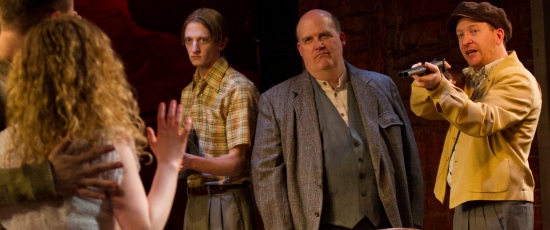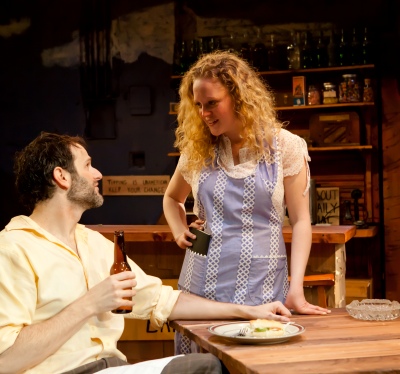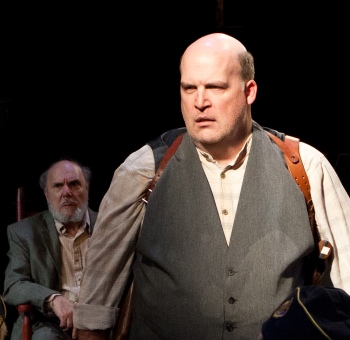With a vision of grace in the Arizona desert, Strawdog draws life from ‘Petrified Forest’
 Review: “The Petrified Forest” by Robert E. Sherwood, at Strawdog Theatre through March 31. ****
Review: “The Petrified Forest” by Robert E. Sherwood, at Strawdog Theatre through March 31. ****
By Lawrence B. Johnson
Can green leaves sprout from trees dead for so long they have turned to stone? That’s the metaphorical question posed by Robert E. Sherwood’s 1935 play “The Petrified Forest,” a chronicle of moribund souls convened at a little diner on the far edge of an Arizona desert.
 Gloomy as that premise may sound, Sherwood’s play is really about hope; more than that, it’s about the gift of life, in any aspiring sense of the word, and the human capacity for noble action. Each of those themes is honored with arresting plausibility and conviction in director Shade Murray’s richly textured production at Strawdog Theatre.
Gloomy as that premise may sound, Sherwood’s play is really about hope; more than that, it’s about the gift of life, in any aspiring sense of the word, and the human capacity for noble action. Each of those themes is honored with arresting plausibility and conviction in director Shade Murray’s richly textured production at Strawdog Theatre.
After more than 75 years, it still seems remarkable that Sherwood, who won Pulitzer Prizes for three consecutive plays between 1936 and 1940, didn’t begin his Pulitzer streak with “The Petrified Forest.” Still, the play fared well enough in its original Broadway run to spawn a film version in 1936. Both starred Leslie Howard as burned out writer Alan Squier, who wanders into this little gas station eatery at the end of the earth just in time to intersect with Duke Mantee, a wanted killer on the lam. Mantee also was played by the same actor on Broadway and, at Howard’s insistence, in the movie: Humphrey Bogart. The celluloid caper made Bogey an instant star.
While it isn’t hard to see how tough guy Mantee might be star stuff, Sherwood’s play is not essentially a confrontation between the killer – who shows up with his motley gang – and the world-weary intellectual. Squier’s confrontation is with himself, and with an improbable angel of mercy called Gabby, the flinty daughter of the diner’s owner, a girl given to direct speech liberally seasoned with salt. The beauty of Strawdog’s production lies in the fine match of Paul Fagen’s sensitive but spiritually exhausted Squier and Caroline Neff’s brusque, restive and eager Gabby.
That said, “The Petrified Forest” works its ultimate magic only if we succumb to Squier’s debilitated charm and subscribe to his utter failure of purpose. Fagen is just such a persuasive derelict, a man who has seen the world but has lost his place in it – a poet without reason whose verses no longer rhyme. A lean, almost fragile figure, Fagen’s hitch-hiking Squier is a penniless creature whose occasional meals are paid for with the coin of humiliation. And still he is a poet, eloquent and knowing, and there’s grace in his crowning gesture.
In Gabby’s eyes, or rather in her vulnerable imagination, this remnant of a man is her knight errant, her savior, and Neff establishes the girl’s boredom as well as her nameless aspiration with such honesty that we can cheer her fatuous vision of a life with Squier. Gabby has ended up here on the outskirts of creation because her French mother got tired of her feckless father and went home to France. But her mother sends her books of poetry by classic French poets like Francois Villon. Though Gabby mispronounces his name, she relishes the translated verses and dreams of seeing France some day.
 Squier, who has lived in France, certainly can say Villon’s name correctly. It is hope at first sight, at least for Gabby. Neff and Fagen play out this off-kilter mating dance with shared nuance: Gabby confident the two of them could make a go of it on love alone, Squier touched deeply by the girl’s vision that was once his own.
Squier, who has lived in France, certainly can say Villon’s name correctly. It is hope at first sight, at least for Gabby. Neff and Fagen play out this off-kilter mating dance with shared nuance: Gabby confident the two of them could make a go of it on love alone, Squier touched deeply by the girl’s vision that was once his own.
Enter Duke Mantee, in the hulking but calm and unromantic person of Jamie Vann. Surrounded by his gunsels, he has picked this spot to wait for his girlfriend to show up. Vann and Fagen complement each other well in their portraits of men of the world, men who know the score: Two losers. When they strike a bizarre bargain, on nothing more than good faith, you expect these curiously similar types to honor the deal.
Strawdog’s supporting cast is worthy of its leads. Shane Kenyon is bull-headed Boze, the ex-football player who pumps gas, runs his mouth and has a thing for Gabby; Ted Hoerl fixes Gabby’s father with the low aim in life that drives the girl crazy (we see why her mother might have fled); and Walther Brody makes a delightfully tedious Gramp, happily repeating to one and all how Billy the Kid once shot at him and missed. Not to be slighted are Jim Poole and Janice O’Neil as a wealthy middle-aged couple, leaking mutual animosity, who find themselves caught up in Duke Mantee’s encampment.
Designer Nic Dimond’s detailed but unglamorous diner set neatly symbolizes the petrification that has frozen the lives of nearly every character in sight. All but two who can still hope.
Related Links:
- The 1936 movie of the same play starred Humphrey Bogart as Duke, Bette Davis as Gabby and Leslie Howard as Squier: Here’s the steamy 4-minute trailer on YouTube
- “Petrified Forest” was Robert E. Sherwood’s eighth Broadway play: See the complete list at IBDB
- Performance locations, dates and times: Go to TheatreinChicago.com
Photo captions and credits: Home page and top: Wanted killer Duke Mantee (Jamie Vann, center) and his gang take over a diner in “The Petrified Forest.” Upper right: Well-traveled writer Alan Squier (Paul Fagen) brings out the romantic visionary in Gabby (Caroline Neff). Lower right: Gramp (Walther Brody, left) says Billy the Kid missed him, but fugitive Duke Mantee (Jamie Vann) has other matters on his mind. (Photos by Leigh Loftus)
Tags: "The Petrified Forest", Caroline Neff, Jamie Vann, Nic Dimond, Paul Fagen, Robert E. Sherwood, Shade Murray, Strawdog Theatre

